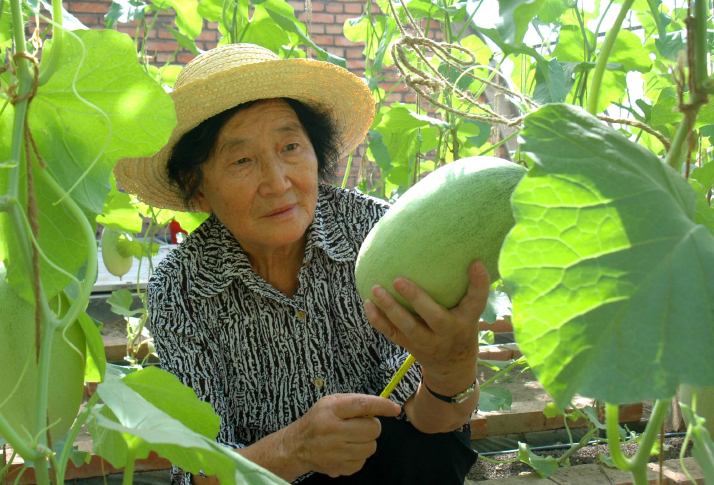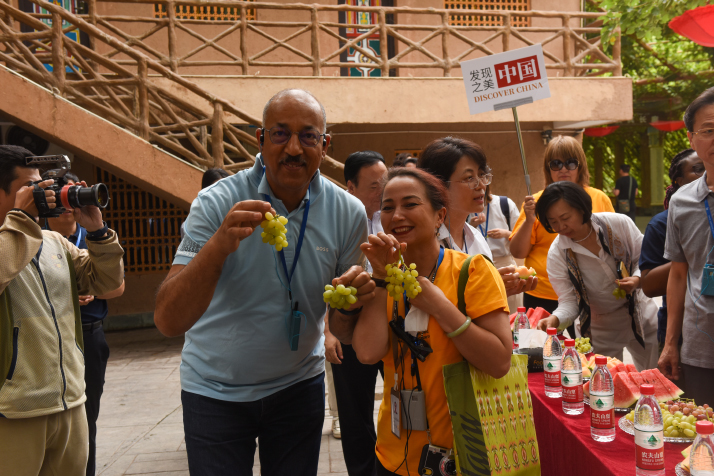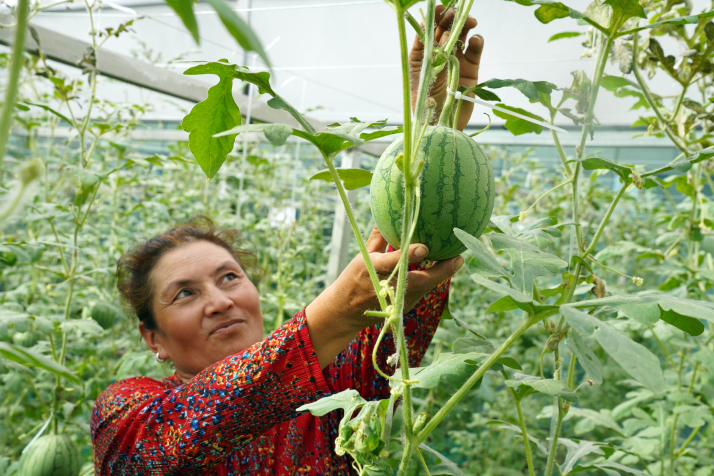| Xinjiang Today |
| Sowing melon freedom | |
|
|
 Wu Mingzhu (CNSPHOTO)
China is the world's largest producer and consumer of watermelon. A video that went viral online in the country said that thanks to Grandma Wu Mingzhu, ordinary Chinese people have achieved melon freedom, that is, they can eat as many melons as they like. The melon freedom stems largely from the seeds she has developed as an agricultural scientist.
Now 95 years old, Wu, known as the "Queen of Melons," lives in Chongqing under the care of her son Yang Xia. She suffers from Alzheimer's disease, and many of her memories have faded. All except for those of melons, which have always remained with her. Whenever she sees melons, her eyes light up, and she smiles. In a recent interview, Yang told reporters, "In recent years, she often says, 'I want to go back to Turpan, I want to return to Xinjiang, I need to work, I need to do pollination in the fields.' Those are the only things she remembers. Sometimes she packs her clothes, pointing at her suitcase, insisting she has to leave." Zhang Xuejun, who joined Wu's team in 2007 to research watermelon and melon breeding, recalled that Wu's most stubborn habit was her unwavering routine of going to the fields every single day. From dawn to dusk, she would crouch among the crops, meticulously recording every melon's growth and changes in form, leaving no seedling unchecked. While colleagues believed inspecting the field every four to five days was enough, Wu, then already in her 70s, insisted on daily inspection. "I felt that none of us could match her drive. She was so full of energy—always the first to arrive, dragging us out into the fields. She carried out original innovation, never simply following what others had done," Zhang said. "Today, all of our melon and watermelon varieties are completely independently developed and not subject to foreign restrictions," he added.  Visitors enjoy fruits at the Grape Valley Scenic Area in Turpan on August 15, 2023 (XINHUA)
To Xinjiang! Wu was born in 1930 in Wuhan, Hubei Province. In 1950, she was admitted to Southwest Agricultural College as part of the first generation of university students in the People's Republic of China. Among her classmates was Yuan Longping, later known as the "Father of Hybrid Rice." Upon graduation, Wu applied to work in Xinjiang, believing it was where she could best apply her expertise. But her wish was denied, and she was assigned to the central rural work department in Beijing. In 1955, hearing that Xinjiang was recruiting, Wu applied again. After persistent application, she was transferred to Urumqi's rural department. Still unsatisfied, she insisted on being sent to Shanshan County's agricultural station in Turpan—a city known as the "Land of Fire," where the maximum temperature in summer can reach 50 degrees Celsius. Although the climate is harsh for crops, it is suitable for melons. Working in the agricultural technology station, she began to do research on melons. Turpan tested her resolve. To collect and preserve endangered melon varieties, Wu braved scorching sun and sandstorms, searching across the Gobi Desert. If caught outside after dark, she simply lodged in caves or wrapped herself in a blanket and slept in the desert. She once narrowly escaped wild wolves. Whenever she heard of a good melon variety, she would travel any distance to purchase seeds for study. Over three years, she visited more than 300 production teams in Turpan, collecting seeds and tested them in fields to develop new varieties. This effort created Xinjiang's first melon resource archive and saved several endangered species from extinction. Breed new varieties In her half-century-long career, she has developed 28 nationally accredited new melon varieties. Wu's first successful new variety in Xinjiang was the "Hong Xin Cui" or red-hearted crispy Hami melon. When then U.S. President Richard Nixon visited China in 1972, Chinese hosts debated what fruit to serve. The Americans mentioned Nixon had heard of Hami melon. Leaders sought out Wu's variety, and Hong Xin Cui was chosen. Nixon was astonished after his first bite. Chairman Mao joked, "How do our melons compare with America's?" Nixon praised them highly, and soon all the officials were happily devouring the fruit. To accelerate breeding, Wu set up a breeding base in Hainan, establishing the "southern propagation, northern cultivation" model. The model takes advantage of the warm climate in the south to accelerate growth cycles and improve experimental efficiency, and then to plant and cultivate crops in the north, where the fertile soil helps enhance crop quality. In 1984, she successfully bred the famously sweet and crisp watermelon Zao Jia 8424. She shared cultivation techniques with farmers for free. The 8424 variety, first cultivated in east China, soon spread nationwide. It significantly boosted production, propelling China to become the world's top producer and consumer of watermelons, giving ordinary Chinese people the "freedom to eat as much melons as they like." At the time, Wu was deputy commissioner of Turpan Prefecture, but she later resigned from her administrative role to focus fully on research, transferring to the Xinjiang Academy of Agricultural Sciences. Behind every major decision stood a steadfast supporter—her husband, Yang Qiyou. Her husband, also her college classmate, gave up opportunities in the city to support Wu's dream. After earning his graduate degree, he went to Xinjiang, becoming the first technician with a graduate degree at the Shanshan agricultural technology station. He helped Wu pollinate melons, translated English and Russian references for her, and cared for her meticulously in daily life. In 1986, Yang died of stomach cancer. From then on, Wu lived like a migratory bird: breeding in Xinjiang during spring and summer, then moving to Hainan in autumn and winter. Every pollination season, she worked side by side with young researchers, manually pollinating vines from early morning until late at night. Wu was elected as a member of the Chinese Academy of Engineering in 1999. Over a period of 62 years, she rescued endangered germplasm, raising China's melon and watermelon seed collection to over 2,000 varieties—the most abundant in the world. "The fruit of my life's work is giving people a few good melons. Quality comes first. Even if a variety is disease-resistant and easy to grow, if it tastes bad, it's garbage on the market. We cannot produce garbage. Ordinary people deserve to eat good melons," she once said.  A woman harvests a watermelon at a cultivation training base in Shule County, Kashi (Kashgar) Prefecture, on September 21, 2024 (XINHUA)
Selfless devotion Decades of overwork took a toll. Wu endured illnesses silently, rarely speaking of them. But her diary reveals: May 24: My head hurt terribly last night. Left for Urumqi hospital at 7 a.m. May 27: The headache is gone, but now my stomach feels awful. No appetite. Truly feel old now—can't keep pushing envelopes. At 81, her memory suddenly collapsed, and she became increasingly confused. Her son brought her to live with him. Yet Alzheimer's slowly consumed her memories, making it difficult to recognize even her closest family. On her last farewell to Xinjiang, Wu suddenly began singing The Girl from Dabancheng, a popular Uygur folk song about a Uygur youth's yearning for a beautiful woman. In her voice, time seemed to turn back 60 years—unveiling the image of a petite girl with braided hair, trudging through the Gobi Desert under the blazing sun with a pack on her back, searching for melon seeds. Comments to taoxing@cicgamericas.com |
|
||||||||||||||||||||||||||||
|